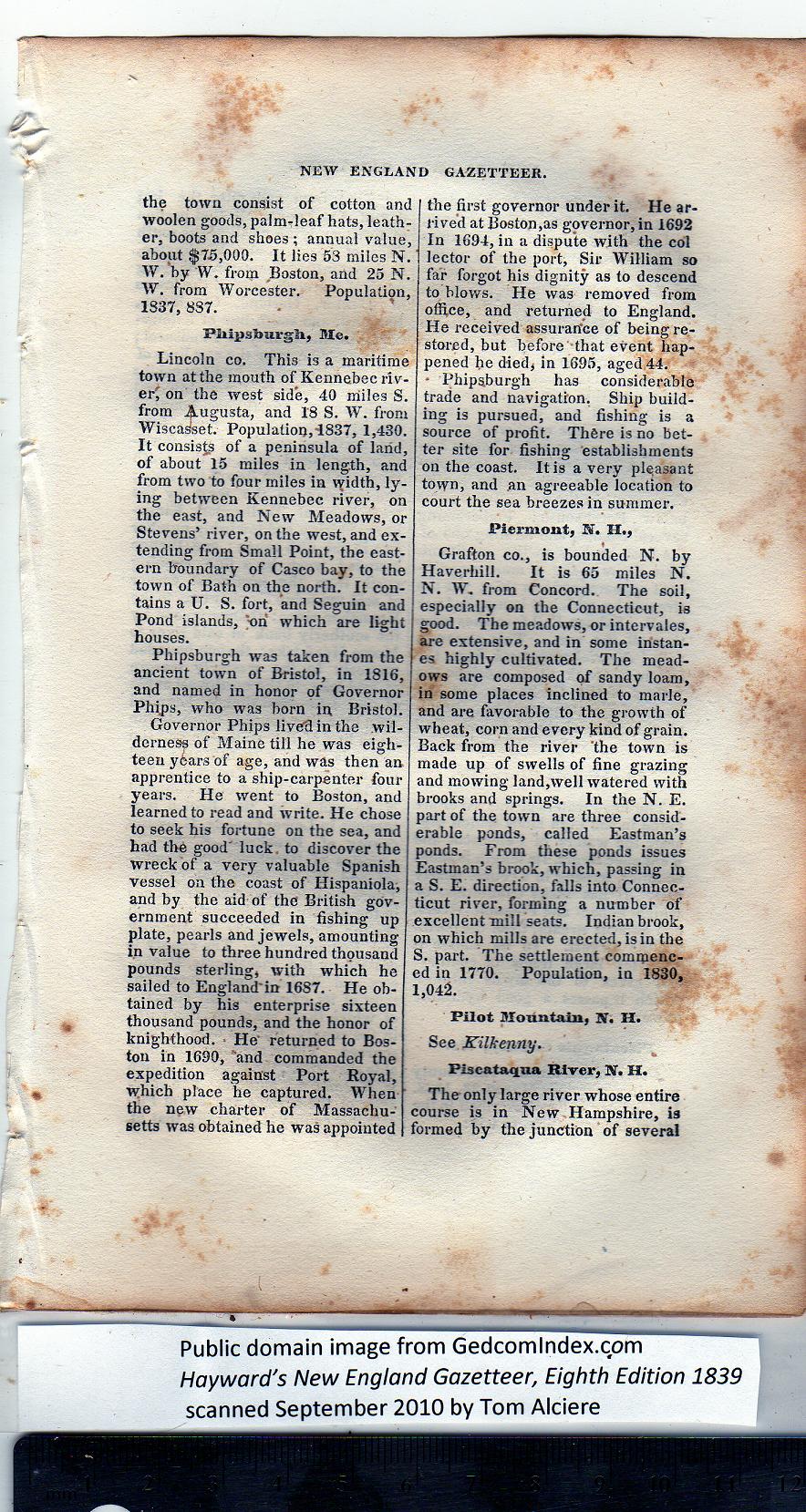|
the town consist of cotton and
woolen goods, palm-leaf hats, leath-
er, boots and shoes ; annual value,
about $75,000. It lies 53 miles N.
W. by W. from Boston, and 25 N.
W. from Worcester. Population,
1837, 887.
Pbipsburgb, Me*
Lincoln co. This is a maritime
town at the mouth of Kennebec riv-
eri on the west side, 40 miles S.
from Augusta, and 1'8 S. W. from
Wiscasset. Population,4837, 1,430.
It consists of a peninsula of land,
of about 15 miles in length, and
from two to four miles in width, ly-
ing between Kennebec river, on
the east, and New Aleadows, or
Stevens’ river, on the west, and ex-
tending from Small Point, the east-
ern boundary of Casco bay, to the
town of Bath on the north. It con-
tains a U. S. fort, and Seguin and
Pond islands, oh which are light
houses.
Phipsburgh was taken from the
ancient town of Bristol, in 1816,
and named in honor of Governor
Phips, who was born in, Bristol.
Governor Phips lived in the wil-
derness of Maine till he was eigh-
teen years of age, and was then an
apprentice to a ship-carpenter four
years. He went to Boston, and
learned to read and write. He chose
to seek his fortune on the sea, and
had the good' luck to discover the
wreck of a very valuable Spanish
vessel on the coast of Hispaniola,
and by the aid of the British gov-
ernment succeeded in fishing up
plate, pearls and jewels, amounting
in value to three hundred thousand
pounds sterling, with which he
sailed to England’in 16S7. He ob-
tained by his enterprise sixteen
thousand pounds, and the honor of
knighthood. He returned to Bos-
ton in 1690, and commanded the
expedition against Port Royal,
which place he captured. When
the new charter of Massachu-
setts was obtained he was appointed
the first governor under it. He ar-
rived at Boston,as governor, in 1692
In 1694, in a dispute with the col
lector of the port, Sir William so
far forgot his dignity as to descend
to blows. He was removed from
office, and returned to England.
He received assurance of being re-
stored, but before that event hap-
pened he died, in 1695, aged 44. |
- Phipaburgh has considerable
trade and navigation. Ship build-
ing is pursued, and fishing is a
source of profit. ThSre is no bet-
ter site for fishing establishments
on the coast. It is a very pleasant
town, and an agreeable location to
court the sea breezes in summer.
Piermont, N« II.,
Grafton co., is bounded N. by
Haverhill. It is 65 miles N.
N. W. from Concord. The soil,
especially on the Connecticut, is
good. The meadows, or intervales,
are extensive, and in some instan-
es highly cultivated. The mead-
ows are composed of sandy loam,
in some places inclined to marie,
and are favorable to the growth of
wheat, corn and every kind of grain.
Back from the river the town is
made up of swells of fine grazing
and mowing land,well watered with
brooks and springs. In the N. E.
part of the town are three consid-
erable ponds, called Eastman’s
ponds. From these ponds issues
Eastman’s brook, which, passing in
a S. E. direction, falls into Connec-
ticut river, forming a number of
excellent mill seats. Indian brook,
on which mills are erected, is in the
S. part. The settlement commenc-
ed in 1770. Population, iQ 1830,
1,042.
Pilot Mountain, X. H.
See Kilkenny.
Fiscataqua River, X* H.
The only large river whose entire
course is in New Hampshire, is
formed by the junction of several |
